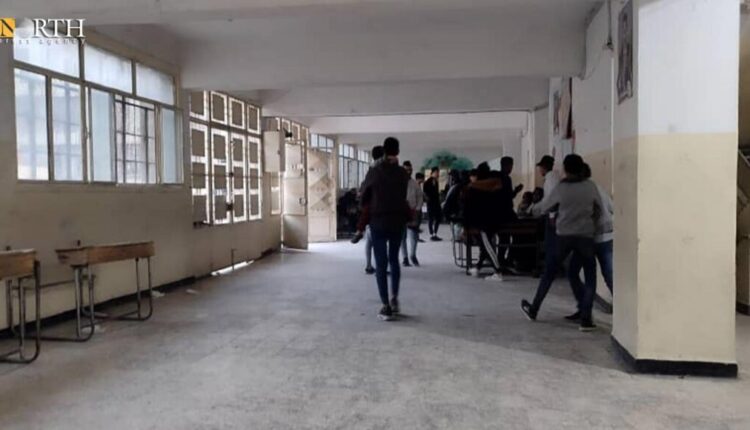
Aleppo, Syria (North Press) – “We are treated like refugees by the administration of the schools that kick us out on a daily basis, and deny us from aid and talking to media,” Fadia sadly talked about the situation in a shelter installed for quake-affected people in Sayf al-Dawla neighborhood in Aleppo, north Syria.
Fadia al-Mustafa, 40, from Aadhamiyye neighborhood in Aleppo, lives in a shelter in Rahmo al-Hatab school in Sayf al-Dawla. Since the first earthquake, she alongside her family evacuated their building due to major cracks in the building’s walls, which later led to its collapse.
“They treat us as if we are prisoners,” Al-Mustafa said describing her situation in the shelter. “We wait for a donor to bring us a sandwich each 24 hours.”
She said that the role of charities is very limited, although “millions of aid entered Syria through airports and border roads, with nobody knows where all this this aid goes.”
State-run SANA news agency said on February 28 that the total amount of aid that arrived via aid planes “amounted to 7.200 tons.”
Al-Mustafa urged the government to work hard to end the current situation in shelters and find a semi-permanent residence for the quake-affected people, especially since she has a disabled nine-year-old boy who needs constant care.
The February 6 earthquake caused the collapse of 54 inhabited buildings, the death of 432 people, and the injury of 714 ones in Aleppo.
Aleppo Council demolished about 300 at-risk buildings as more than 13.000 families were hit by the quake.
On February 10, the Syrian government declared the governorates of Aleppo, Latakia, Hama, and Idlib disaster areas.
Shelters Without Services
Twenty-four days following the earthquake, the affected people continue to suffer from the consequences with no clear solutions. Their houses collapsed and they were relocated into temporary shelters set up by the government as part of its emergency response to the earthquake.
Atef al-Ayed, 49, from Bustan al-Qaser neighborhood in Aleppo, said, “We cannot call this a shelter, as it lacks assistance from the government and NGOs which make use of the affected people without offering any help. We have spent days in cold without food. We are citizens, not refugees.”
“If the response had been serious by officials, I would not have lost my house and waited for aid from the government,” Al-Ayed said. “The government keeps aid stored without distributing it, so we would tell the media that we need aid and medicine.”
Aleppo Governorate lacks management of natural or military disasters, according to al-Ayed.
The current management “has proved its failure in the past years, especially when addressing the issue of the damaged buildings during war,” he added.
On February 18, more than 100 shelters have been evacuated, including schools and places of worship that used to house people affected by the earthquake.
Individual Mistakes
An exclusive source from Aleppo told North Press on the condition of anonymity that Syria is going through a new phase of disasters and “the present staff has not learnt how to deal with such cases of great destruction.”
The first phase following the quake was “very difficult”, he added.
The official said that there were “individual mistakes” against the affected people in the shelters and that “many directors were dismissed from their jobs as a result.”
